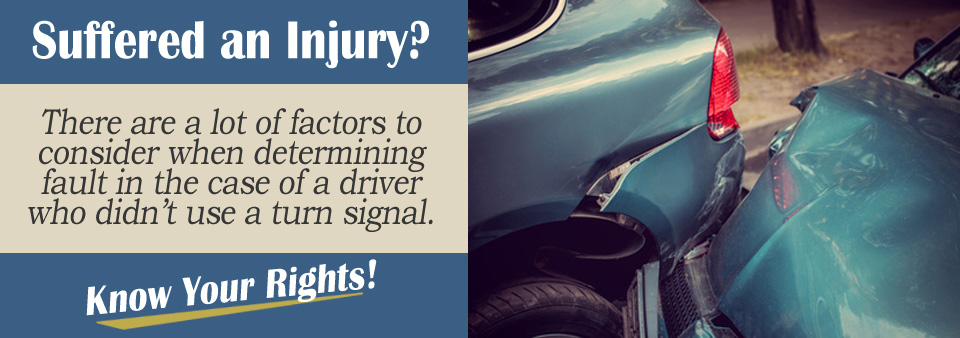Say you are driving along when the car directly in front of you turns without any signal indicating that he or she was about to turn. You slam on your brakes, but it is too late. You collide with the vehicle.
Had you known the car was going to make a turn, you would have done everything possible to avoid hitting him or her. Does that mean you are at fault, or is the other driver automatically at fault?
We have asked attorney, Alaina Sullivan, about what you should do. Here is what she had to say.
Who Is At Fault If A Car Signals But Doesn't Turn
The first misconception that should be clarified is regarding liability; namely, no driver is ever automatically considered at fault. The facts and circumstances surrounding why the accident occurred are almost always considered, and the insurance company must review these prior to making an official determination on “blame.”
Rear-End Collision Car Accident
Normally, when another car is rear-ended, it is the driver who struck the vehicle from behind that is held liable for damages such as broken blinkers. The reasoning for this is that it is relatively difficult for another car to force someone to strike them when that car is driving in front.
Rear-end collisions come when someone is traveling too quickly to stop in time or is driving too closely to the car in front of them.
However, once it is established that the collision is a “rear-end” collision, other factors are then considered that would reduce the liability of the driver who hit the car in front of him or her.
Factors to Consider After A Turn Signal Accident
Many factors may then be considered in a rear-end collision. One of these factors would be whether the driver in front had any part in the cause of the accident.
Did he or she suddenly slam on the brakes, giving very little time for the driver from behind to react properly? Did the driver not use his or her turn signals to indicate that he or she intended to change direction of the vehicle, giving the driver from behind no opportunity to react appropriately?
However, the insurance company may also look at how fast the driver from behind was traveling or whether he or she was following the first car too closely.
Even if the driver signaled, would that have given the other driver time to react appropriately or would the collision still have happened regardless? All of these questions must be answered by the insurance company when coming to a conclusion regarding fault.
Contributory or Comparative Negligence
In states where contributory or comparative negligence are followed, even if you were the driver who rear-ended the car in front who failed to signal, that individual’s actions could at least reduce the amount of liability you played in the car accident.
In these states, the percentage of “blame” that a driver would play in the cause of the accident would reduce the percentage of fault you hold due to your part in the accident. In some states, if that percentage is more than 50 percent, there is the possibility that you will not be held liable.
Every state differs, and it is important to speak with a personal injury attorney first to see what your state policy is when both drivers play a part in the cause of an accident.
Contact an Attorney Today
If you have been involved in a car accident where the driver in front of you failed to signal and you have questions as to which party is to blame, it is always recommended that you contact an attorney today to discuss your case if you do not currently have a lawyer or have any questions. A lawyer can help you gather evidence, write a car accident demand letter, and negotiate a settlement.
A licensed personal injury attorney will be able to evaluate your case and determine if you have a claim against the other party’s insurance company. To receive the compensation for your medical bills, property damages, and pain and suffering, you should speak with a personal injury attorney in your area today. If you are wondering, do you have to pay for a lawyer upfront, the answer is no. Personal injury attorneys are paid on contingency fees.

